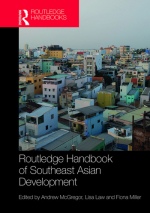Religious influences on social enterprise in Asia: Observations in Cambodia, Malaysia and South Korea
A cursory examination of literature shows that religion and business are historically intertwined, with particular effects on society. Since the business/religion relationship is strongly driven by ethos, this relationship appears as an interesting and relevant issue in the case of social enterprises (hereafter SEs), which are value-driven initiatives. This chapter takes a look at the influence of religion on SEs in East Asia—the most religiously diverse region of the world.

